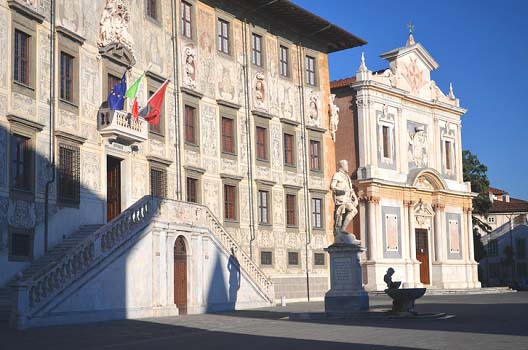Italy: Is it worth going to university?

Beautiful building of University and church on Piazza dei Cavalieri in Pisa, Tuscany - Italy
Rome: In Italy, where the numbers of students signing up for degree courses is said to have dropped by 40,000 between 2003 and 2018, the question on many student’s lips is, “Is it really worth going to university?”
This is a question that students ask themselves even after starting their degree courses, with some coming to the conclusion that it isn’t worth the long-term commitment, leading to a drop-out rate that, each year, hovers around the 42% mark. A friend’s daughter started university to do a Food Sciences degree but dropped out shortly after starting and did a short 6-month course instead to work in the farming industry. She stepped straight into a job and she couldn’t be happier.

These are striking statistics, which are perhaps not that surprising on reflection, when we consider that in 2002 the euro replaced the Italian lira and families in Italy saw the real value of their incomes shrink practically overnight, leaving less available for university fees. This despite Italy’s degree courses costing a fraction of the price of a degree at a UK university — capped at £9,000 per year, compared to €2,821 per year, for example for a Law degree at La Sapienza University in Rome or €2,924 for Engineering, Architecture or Medicine. In fact, universities in Italy can be an attractive proposition for overseas students. Just short of eighty-four thousand international students were signed up to degrees at Italian universities in 2017-18. Overseas students can take advantage of the fact that, in more recent years, more and more courses are available in English as well as Italian.
But let’s face it, some people just aren’t cut out for academic life. Specialist courses to learn a trade l to jobs in hairdressing, light engineering or in the catering and hospitality industry, for example. Other people are naturally more entrepreneurial and have a knack for innovation that doesn’t necessarily require a degree. More people, though question the merits of a degree when they know that job opportunities in Italy are hard to come by once you get that piece of paper.
I asked Giulia Lo Verso, a Masters student in Film Production at the University of Sunderland in the UK, who did her undergraduate degree in Cinema Studies in Torino, Italy, whether she thought getting a degree at an Italian university was worth it. “Yes,” she says immediately. When I ask why she says, “…because of the knowledge, the range of courses you can study, the professors who are very well-prepared. For example, in comparison to the home students in the UK, I feel I have a deeper knowledge of the history of cinema and theatre. We study a wider range of subjects at high school too.”
Despite the merits of university in Italy, Giulia goes on to say that on graduating two years ago there was practically no chance of her getting a job in the field without the right contacts. She does also point out that it is pretty similar in the UK too for cinema related subjects. Indeed, getting a job in a field that relates to your degree in Italy can be the exception rather than the norm.
A friend of Giulia’s originally from Val D’Aosta gave up on her aspirations in Cinema and got a job as a support teacher for a school in Carignano, a small town near Torino. Her undergraduate degree eventually got her a job but she also had to do an additional course to have a chance of a place at the school where she currently enjoys a stable position. Another friend, also from Val D’Aosta, hasn’t been so lucky and has been unemployed for the last two years, despite being a highly talented animation artist. Since graduating she has only found temporary employment doing some graphic design for a hotel website but is still waiting to be paid for her efforts. I asked Giulia if she thought getting a Masters in Italy increases your chances of employment. “Maybe. If it’s from a more prestigious university such as Bocconi in Milan.” She explains that there is more support and assistance there in helping Finance students get internships to build experience so that they’re more attractive to employers on graduating. The Politecnico in Torino also offers support for students looking for internships and grants or sponsorship to nurture start-ups.
Roberto, Giambra, a teacher at a private school in the province of Torino says “I think it’s worth getting a degree if you’re pursuing a specific career but so long as that’s what you really want to do. If you’re doing it just to have a piece of paper for a job, it’s better to start working to earn some money and get a degree later.” He does on to say, “Any company looking for employees are more likely to hire someone of the same age with experience than someone who has just graduated. You can always go back to school but no-one is going to give you those years back… the ones you spent getting a degree. You finish high school at 19 then graduate when you’re around 23-24, but you have no experience, just a certificate. Unless you want to be an engineer, a vet or a doctor, for example. So, you can pursue that but it has to be a passion in my opinion.”
Clearly the answer to whether getting a degree from an Italian university is worth it depends on what your aspirations are. You might find a quicker route to employment by doing shorter courses that are more focused on a specific trade or sector of work or you might find that, on pursuing a degree, you have to accept that you may not necessarily get a job in that field. In that case, your passion for the subject, your knowledge and the skills you learned are transferable skills that can potentially make you even more attractive to employers. However, this is so long as you know how to showcase those passions and skills as core abilities that you can highlight in an interview that show you can make a valuable and unique contribution to an organization.
Italics Magazine was born less than two years ago in Rome, from the idea of two friends who believed that Italy was lacking a complete, in-depth, across-the-board source of information in English. While some publications do a great job, writing about the latest news or focusing on specific areas of interest, we do believe that other kinds of quality insights are just as needed to better understand the complexity of a country that, very often, is only known abroad for the headlines that our politicians make, or for the classic touristic cliches. This is why Italics Magazine is quickly becoming a reference for foreign readers, professionals, expats and press interested in covering Italian issues thoroughly, appealing to diverse schools of thought. However, we started from scratch, and we are self-financing the project through (not too intrusive) ads, promotions, and donations, as we have decided not to opt for any paywall. This means that, while the effort is bigger, we can surely boast our independent and free editorial line. This is especially possible thanks to our readers, who we hope to keep inspiring with our articles. That’s why we kindly ask you to consider giving us your important contribution, which will help us make this project grow — and in the right direction.





